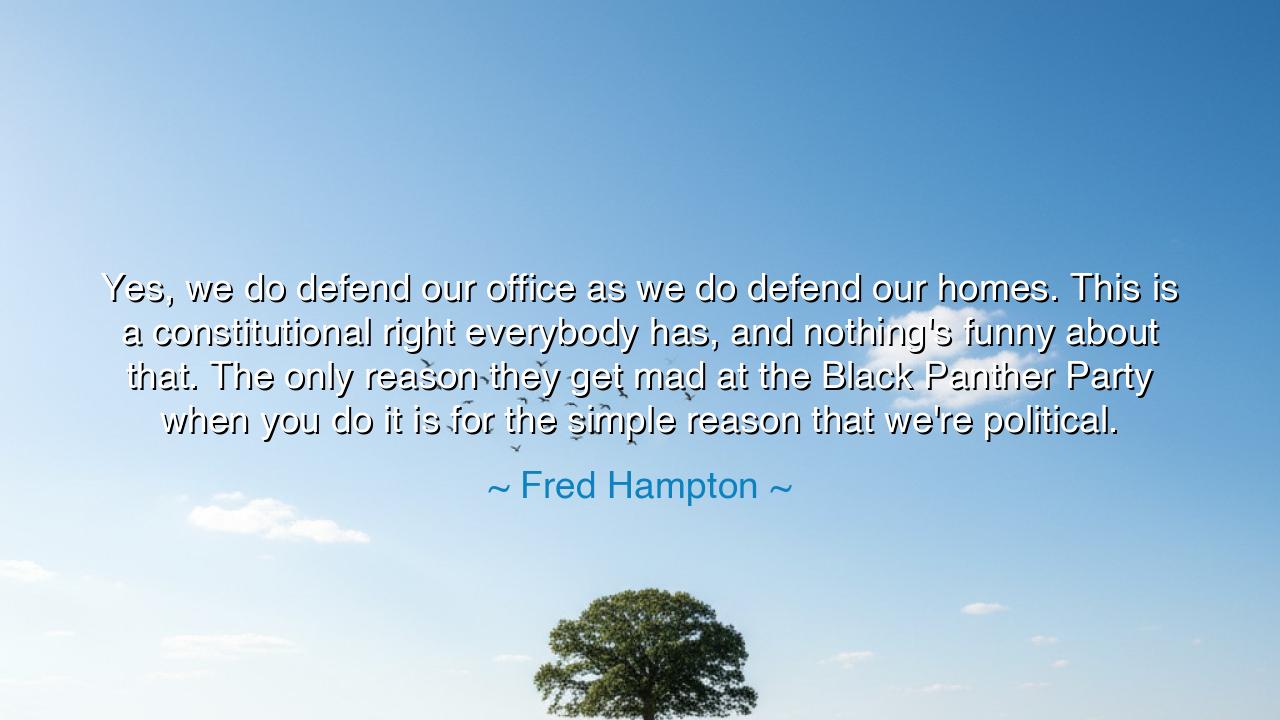
Yes, we do defend our office as we do defend our homes. This is a
Yes, we do defend our office as we do defend our homes. This is a constitutional right everybody has, and nothing's funny about that. The only reason they get mad at the Black Panther Party when you do it is for the simple reason that we're political.






“Yes, we do defend our office as we do defend our homes. This is a constitutional right everybody has, and nothing’s funny about that. The only reason they get mad at the Black Panther Party when you do it is for the simple reason that we’re political.” Thus spoke Fred Hampton, the young lion of Chicago, a man whose words burned with the light of truth and justice before his life was cruelly taken. In these lines, he speaks not only of the right to defend oneself, but of the ancient and eternal struggle—the struggle of the oppressed to be seen as human, to claim the rights that the powerful proclaim but rarely allow. His words are both defiance and lament, a declaration that dignity must be protected, even when the world calls that protection rebellion.
When Hampton says they “defend their office as they do their homes,” he reminds us that the space of freedom is sacred, whether it be a family’s dwelling or a people’s movement. The Black Panther Party’s offices were not merely rooms with walls; they were sanctuaries of empowerment, where breakfast was served to children, where books replaced ignorance, and where love of community was sharpened into courage. To defend such a place was not an act of war, but of survival. Yet to those who feared equality, this defense was seen as an act of provocation. Thus Hampton’s voice rises not with apology, but with reason: “This is a constitutional right everybody has.”
The constitution—the written promise of a nation—declared that all men had the right to bear arms, to peaceably assemble, to speak and stand without fear. But as history shows, those rights have often been measured not by law but by power. Hampton’s truth exposes the hypocrisy of his time: that the same act celebrated when done by some was condemned when done by others. The Black Panther Party, being political, made visible what others wished to keep hidden—that America’s promise was not yet fulfilled, that justice had not yet reached every door. And so, those who claimed equality became targets, not for breaking the law, but for daring to invoke it.
This pattern is as old as civilization itself. The ancients, too, punished the truth-tellers. Socrates was condemned for corrupting the youth, though his only crime was teaching them to think. Spartacus was crucified for rebelling against chains that no man should wear. So too was Fred Hampton, who at twenty-one stood not as a criminal, but as a philosopher of action. When he said, “nothing’s funny about that,” he was stripping away the veil of mockery that society often casts upon the oppressed, as if to laugh at their pain were to erase it. He would not let them laugh away his people’s right to exist in dignity.
To defend one’s home—what could be more natural, more human? Yet in America’s long and bloodied history, some have been told their homes are not truly theirs. The Panthers stood against this lie. They armed themselves not for conquest, but for equality, for the right to live without fear in their own communities. And this, as Hampton said, was why they were hated—because they turned defense into philosophy, survival into politics. They demanded that the rights written on paper be made flesh, and that the shield of justice extend to all, not just the privileged.
But Hampton’s words also teach us restraint, wisdom, and clarity. His defense was not born from hatred, but from purpose. He believed that true revolution was not of bullets but of hearts, that political consciousness was the greatest weapon of all. “You can kill the revolutionary,” he said once, “but you can’t kill the revolution.” To defend, in his mind, was not merely to guard a building—it was to guard the soul of a people from despair. His life and his death remind us that courage without wisdom becomes rage, but courage joined with vision becomes freedom.
So, dear listener, remember this lesson: to defend what is sacred is not rebellion; it is responsibility. The office, the home, the heart—all deserve protection when threatened by injustice. Yet remember also that the highest form of defense is understanding, and the truest victory is not in destruction, but in transformation. Let your defense be guided by truth, your actions by love, and your conviction by the knowledge that rights belong to all, or they belong to none.
For Fred Hampton gave his life to remind the world that equality is not granted by the powerful—it is claimed by the brave. His words still call out across time: defend your dignity, defend your people, defend your right to be free. And when they mock you, when they call your defense a crime, remember—“there’s nothing funny about that.” For the defense of justice is the oldest and noblest duty of humankind.






AAdministratorAdministrator
Welcome, honored guests. Please leave a comment, we will respond soon